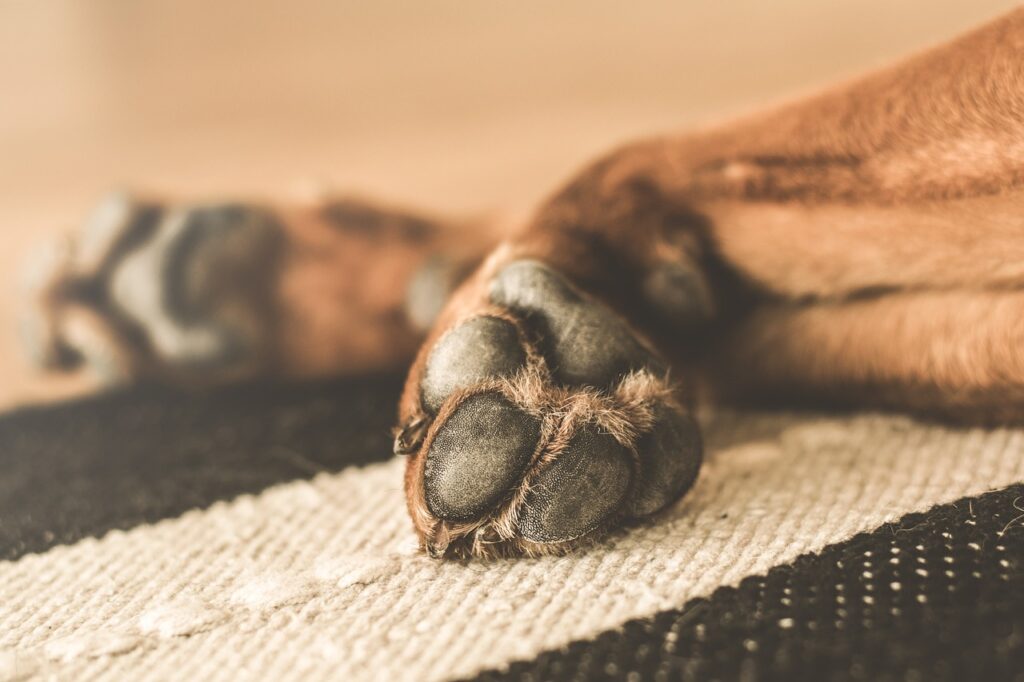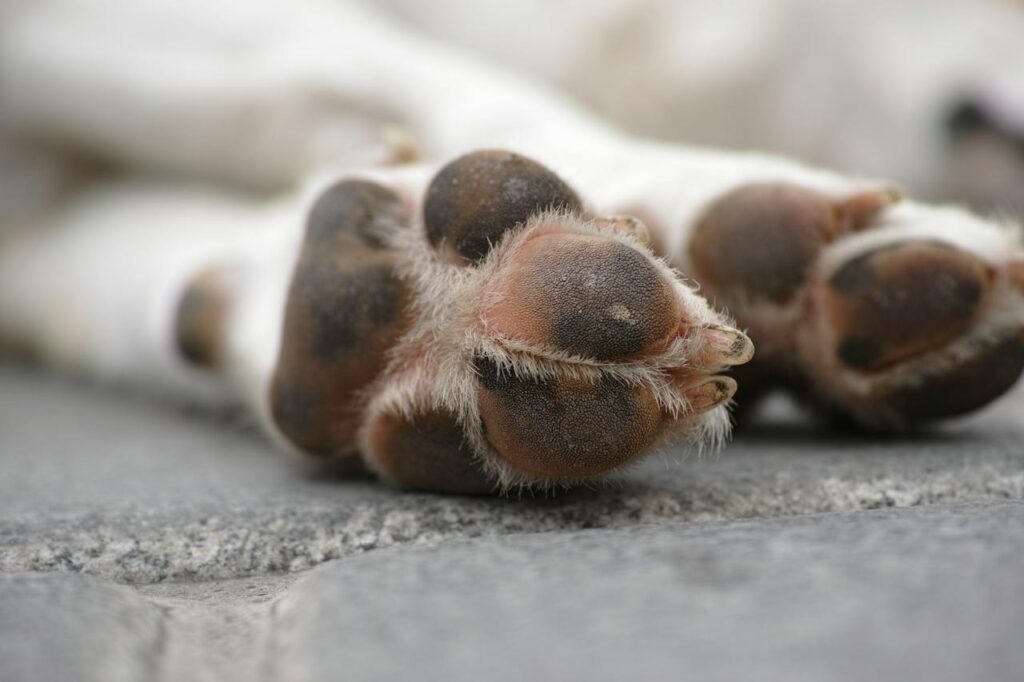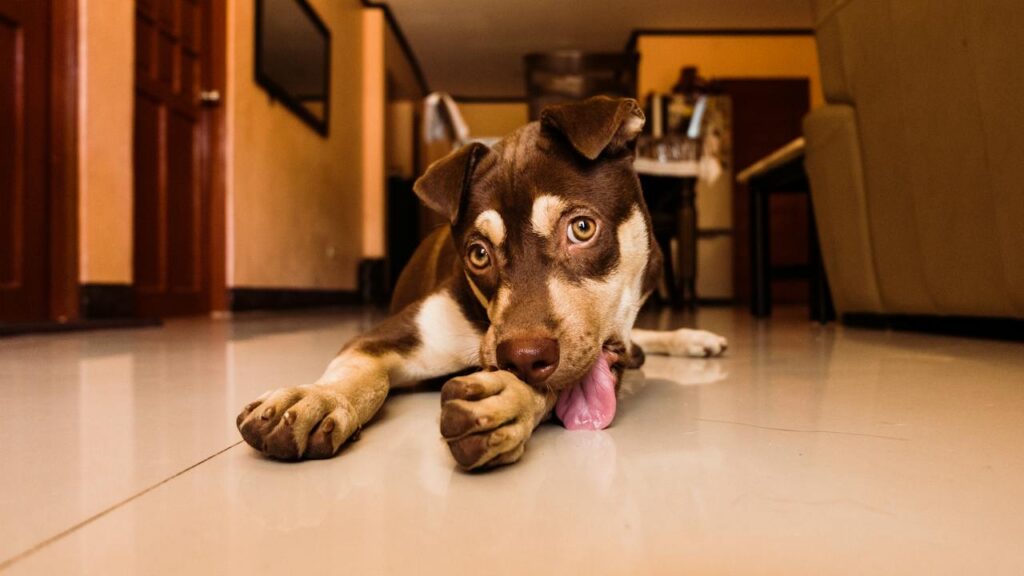It is common for dogs to lick their paws as it provides them with a sense of pleasure or helps alleviate itching.
However, if your beloved pet licks itself, it is important to remain vigilant and investigate the underlying causes.
In this article, you will find out what to do if the dog licks its paws and get information about possible illnesses that could be causing this behavior.
Table of Contents

Why dogs lick their paws: Let’s find out
Dirt and contamination
Every day, our loyal companions’ paws endure significant strain. The dirt and debris from the streets have the potential to infiltrate their delicate skin, leading to inflammation.
During the winter season, dog paws face an additional obstacle in the form of road salt and gravel. These substances pose a genuine challenge as they make the paws more vulnerable and prone to stress, primarily due to the temperature contrast between indoors and outdoors. Even the tiniest cracks in the skin can allow the brine to seep into the paw pads, resulting in dry and itchy skin.
Psychological reasons for paw-licking
The incessant licking and chewing of the paws may also have a psychological origin. Dogs that experience fear of being left alone or suffer from boredom engage in this behavior, similar to how humans would bite their nails. The dog licks its paw as a means to alleviate its internal stress.
Foreign bodies and injuries to the paw

If a splinter, thorn, or wood chip enters your dog’s paw, your canine companion will attempt to lick the foreign object. Additionally, grasses or other plant parts may become trapped between their toes, leading to discomfort.
Small cuts or cracks can occur in stony subsoils. Through licking and chewing at the affected area, the dog indicates that there is an issue.
Paw burnt
During the summer season, our furry companions can burn their paws on hot asphalt. This happens because their paw pads become sensitive and fragile due to the dryness. To alleviate the discomfort, dogs often lick their paws after a walk, using their saliva to cool down the burning areas.
Allergies/food allergy
If your furry buddy frequently licks his paws after meals, it could be a sign of a food allergy. Some ingredients in dog food may not agree with him. Additionally, allergens or cleaning chemicals on the floors can irritate his paws, causing an uncomfortable itch.
Interior abscesses
Small injuries can sometimes lead to long-lasting abscesses between your dog’s toes. These abscesses can be painful and itchy, requiring veterinary treatment.
Krallenburch
If your dog starts whining and limping or stops appearing, paw licking might suggest a broken or torn claw. Bleeding may not always happen, so it might not be obvious right away.
To ease the discomfort, your pet will continuously lick its paw. Prevent any inflammation that may occur and get the broken claw treated by a vet as soon as possible.
Yeast fungi (Malassezia)
Yeast fungi (Malassezia) cause skin inflammation between dogs’ toes. These multiply and cause severe itching. To prevent your darling from licking the affected areas sore, special medical shampoos can be used for treatment.
Parasite infestation
If the areas that were licked appear to have pustules or redness and the skin looks different from before, it means that parasites like fleas, mites, or ticks are causing the problem. The veterinarian will examine it under a microscope to confirm and provide the necessary treatment.
Matted areas
Long hair on the paws can get tangled and cause matting. This can create a perfect environment for dirt, parasites, and infections to thrive.
5 tips and tools to break the habit of licking your paws
Burnt paw – immediate assistance
If your dog’s paw is burned, it is important to provide immediate help. Start by cooling the paw under running water. You can also use a cold pad from the freezer (wrapped in a cloth) or damp towels as compresses to help with the pain.
After giving initial care, it is crucial to take your dog to a veterinarian as soon as possible. The vet will be able to assess the severity of the burn and provide appropriate treatment.
Removing foreign objects – immediate assistance
If there are foreign objects in your dog’s paw, it is important to act quickly. First, scrutinize the paw in good lighting to identify the cause. Then, clean the wound thoroughly under running water. Disinfect the affected area and trim the hair around the paw pad if necessary.
Using sterile tweezers, remove the foreign object. If the wound is bleeding heavily or gaping, it is advisable to consult a vet. You can also apply some iodine or a wound care spray if available.
To prevent further licking of the wound, it is recommended to apply a loose paw bandage.

Paw care to prevent excessive licking
Regular paw care is important to prevent tangled fur and contamination. You will need grooming scissors, a mild dog shampoo, and paw balm (such as milking fat). After cleaning the paws, apply the balm to maintain the skin’s elasticity, especially during temperature changes in summer and winter.
Trimming the claws is also essential for your dog’s well-being, as long claws can cause discomfort.
Preventing boredom and anxiety
Dogs often lick their paws when they are bored or anxious. Targeted training can help alleviate this behavior. If you notice signs of fear in your dog, such as anxiety when leaving the house, consulting a behavioral therapist can be beneficial.
A healthy diet for a stronger immune system
A healthy diet can strengthen your dog’s immune system, making it more resilient to allergens and irritants. If your dog is sensitive to certain foods, it is important to provide a diet that supports their overall health.
Home remedies for frequent licking of my dog’s paws
- To help with your dog’s frequent paw licking, try applying aloe vera gel to the itchy area three times a day. This will cool and soothe the irritated skin.
- If your dog keeps licking its paws, you can make a mixture by brewing chamomile tea and adding two tablespoons of fennel seeds. Let it steep for 12 hours, cool it down, and then apply it to the affected area of your dog’s paws. Massage it in gently.
- A great home remedy for your dog’s paw licking is using dried marigold petals. Boil a handful of them with half a liter of water, let it cool, and then massage the decoction into the affected area three times a day.

When is paw licking in dogs due to illness?
If your dog is licking its paws more frequently than usual, it could indicate a more severe illness. Pay close attention to your furry friend’s behavior and examine their paws for any changes in the skin or signs of injury to determine potential causes. If they continuously lick their paws and they become sore, it is important to seek treatment. If you are uncertain, it is advisable to consult with your veterinarian.